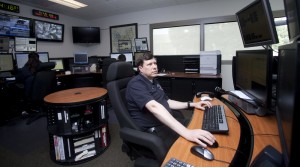There are always a few calls that become ingrained in a dispatcher’s memory.
Two years ago, dispatcher Eric Dunn answered such a call – a man in a car had cut himself with a knife and his location was unknown.
From his desk in the university police station, Dunn talked to the man while police pursued him in a car chase through Westwood. Dunn was still on the line trying to calm the man when police found him outside the Ronald Reagan UCLA Medical Center and shattered a window to get the man out of his car. The man later received treatment and mental health counseling.
“It’s always a relief. He’s out of the vehicle, he’s getting help and all the officers are safe. That’s a successful call,” Dunn said, in front of the intricate mesh of screens and lights illuminating his desk.
Dispatchers for the university police department are the behind-the-scenes staffers for UCLA’s emergency situations. Tucked upstairs in the red brick UCPD building on Westwood Plaza, dispatchers answer calls about everything from people asking for directions to the rare armed robbery. And, when necessary, they ensure the police officers respond to people in need.
 [media-credit name=”Yin Fu/Daily Bruin” align=”alignnone” width=”300″]
[media-credit name=”Yin Fu/Daily Bruin” align=”alignnone” width=”300″]
“Dispatch are the conductors, and you have all these people playing instruments,” said UCPD spokeswoman Nancy Greenstein.
Without dispatchers, police officers would not know where to go or how to help those that need help urgently, said Laura Herrera, manager of the communications center at UCPD.
The dispatchers work 12-hour shifts to staff their department 24 hours a day.The process of dispatching officers involves a significant amount of multitasking, Herrera said. Dispatchers often are talking on the phone and inputing information while monitoring their radios.
When a call comes in, dispatchers must classify it based on the type of incident it is, Herrera said. There are 100 different codes the dispatchers can use to classify the call, ranging from serious, such as an assault, to minor, such as a citizen needing assistance.
The station receives about 100,000 phone calls per year and only 7,500 of them come in through UCPD’s 911 system, Herrera said. The center receives several citizen-assist calls concerning topics such as finding a lost car to providing campus directions.
The department also dispatches officers as far as Santa Monica to patrol the UCLA Medical Center there, Herrera added.
Dunn, the supervisor for the communications center at UCPD, began his career with UCPD while he was an undergraduate student at UCLA in the late 1990s.
His roommate was a community service officer, or a student who patrols the area on behalf of UCPD, and the position sparked Dunn’s interest. He became a community service officer himself and was eventually offered a full-time position with the department after he graduated.
His career with dispatch has continued because of the spontaneity of his work, he said. “Everyday is different and you never know what’s going to happen,” Dunn said, as the light from the four computer screens reflected off his eyes.
Muffled voices emanated from his police radio, and as they grew clearer, he struck his keyboard with agile fingers. Another call was coming in.
